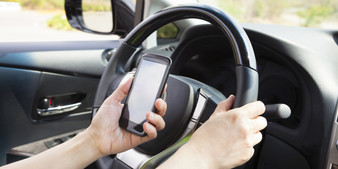
By Alexia Santos
You are driving down the street, no traffic, nothing keeping you from checking that constant buzzing in the next seat. You have a text message. What's the harm in checking it? You pick up the phone and open up messages. Just as you are sending the text, you are pulled over. No use lying. This officer has a texalyzer and you are about to face charges as hefty as driving under the influence.
You are driving down the street, no traffic, nothing keeping you from checking that constant buzzing in the next seat. You have a text message. What's the harm in checking it? You pick up the phone and open up messages. Just as you are sending the text, you are pulled over. No use lying. This officer has a texalyzer and you are about to face charges as hefty as driving under the influence.
Proposed in New York and under debate of becoming a law, the textalyzer is a device similar to a breathalyzer, but it would check recent activity on one’s cell phone. This does not include just texting. It also includes emails or any other activities that are banned under New York law.
There are concerns, such as the obvious red flag, privacy. However, Félix W. Ortiz, a Democratic assemblyman who was a sponsor of the bipartisan Textalyzer bill, said that it would not give police access to any content of the messages themselves. They would just see that a message was sent.
This is not a fully fledged New York law, but it is under serious consideration. In 2001, handheld devices were banned for drivers while on the road, but Ortiz says People are going to be more afraid to put their hands on the cellphone.” If they have something on record, much like DUI’s for driving under the influence.
If the textalyzer was to pass, it is suspected to spread throughout the rest of the states much like the phone ban when it first passed. Again, Ortiz insist it is not an invasion of privacy, but a way to catch multitasking drivers and keep them from putting others in danger.
Texting and driving has and continues to be a killer at large, and, unlike drunk driving, is socially acceptable. Jay Winsten, an associate dean and the director of the Center for Health Communication at Harvard’s School of Public Health, said on the topic, “We’re losing the battle against distracted driving.”
So the question is not, “Have you been drinking tonight?” anymore but, “Have you been texting tonight?”